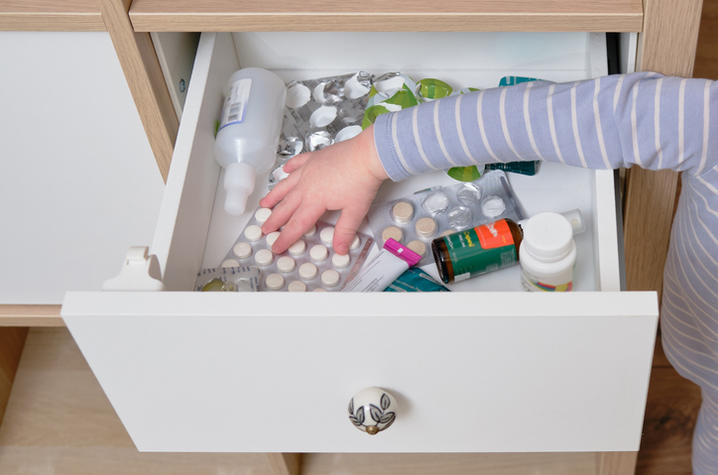Medication safety in your home this holiday season

The University of Kentucky Public Relations and Strategic Communications Office provides a weekly health column available for use and reprint by news media. This week's column is by Kyle Bryan, Pharm.D., practice implementation pharmacist and adjunct assistant professor of pharmacy science and practice at the UK College of Pharmacy.
LEXINGTON, Ky. (Dec. 21, 2023) — Each year, Poison Control Centers in the United States receive over 1 million calls due to accidental poisoning of young children, and approximately 35,000 young children are treated in emergency departments.
On average, a child is rushed to the emergency room every nine minutes due to accidental ingestion of medication. During each holiday season, there is a rise in poison exposure incidents as family and friends gather for celebrations where adults may be distracted, and children explore new surroundings.
While proper medication safety and storage should be a concern year-round, the holiday season presents unique challenges that increase risks to child safety.
People who host parties and guests without children often do not consider the issue and may bring medications in their bags or coats, often left in an unobserved and easily accessed location. A mere moment's distraction can lead to a child accessing something harmful, but with these simple tips, you can help maintain a festive spirit for everyone.
Tips for protecting children from accidental ingestion:
- Keep medications up and away from children: Medications should never be kept on counters or in easily accessible locations such as cabinets or nightstands and are best kept in locked containers or medication safes.
- Remember that child-resistant does not mean child-proof: A package labeled as child-resistant usually means it would take a 5-year-old child longer than five minutes to open it.
- Know what’s in your home: If you have guests, ask if they have any medications that should be secured away from children’s reach.
- Keep medications in their original containers: Many accidental medication ingestions occur when a child gains access to a non-original container, such as a medication planner. If you must use a planner, ensure it is securely stored.
- Dispose of old or unwanted medications: If you have outdated medications in your home, throw them away. Many pharmacies offer takeback programs for safe disposal of old prescription medications.
- Program the Poison Control Center number (800-222-1222) into your phone: the Poison Control Center is open 24/7 and available for accidental ingestion cases.
- Do not tell children that medication is candy: children often mistake many medications, e.g., melatonin gummies, with candy. When giving a child medication, emphasize that it is not candy and should only be taken under adult supervision.
What should you do if a child has ingested a medication?
- Remain calm and check the child’s mouth to ensure there aren’t any pills or other items they haven’t yet swallowed.
- If the child is unresponsive, experiencing symptoms or in discomfort, call 911 immediately.
- If they are responsive and seem otherwise fine, call the Poison Control Center number (800-222-1222).
- Try to identify the medication the child ingested, estimate the quantity, and determine the time elapsed since ingestion.
Proper medication storage is one of the best ways to ensure child safety. Regularly review the medications in your home to check if they are still needed, and consult your local pharmacist for guidance on the safe disposal of old prescription medications.
For more information and resources, visit Face It or the Centers for Disease Control and Prevention.
UK HealthCare is the hospitals and clinics of the University of Kentucky. But it is so much more. It is more than 10,000 dedicated health care professionals committed to providing advanced subspecialty care for the most critically injured and ill patients from the Commonwealth and beyond. It also is the home of the state’s only National Cancer Institute (NCI)-designated Comprehensive Cancer Center, a Level IV Neonatal Intensive Care Unit that cares for the tiniest and sickest newborns, the region’s only Level 1 trauma center and Kentucky’s top hospital ranked by U.S. News & World Report.
As an academic research institution, we are continuously pursuing the next generation of cures, treatments, protocols and policies. Our discoveries have the potential to change what’s medically possible within our lifetimes. Our educators and thought leaders are transforming the health care landscape as our six health professions colleges teach the next generation of doctors, nurses, pharmacists and other health care professionals, spreading the highest standards of care. UK HealthCare is the power of advanced medicine committed to creating a healthier Kentucky, now and for generations to come.




